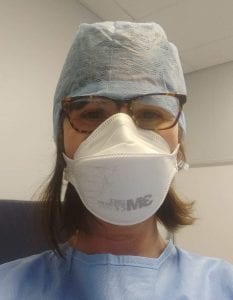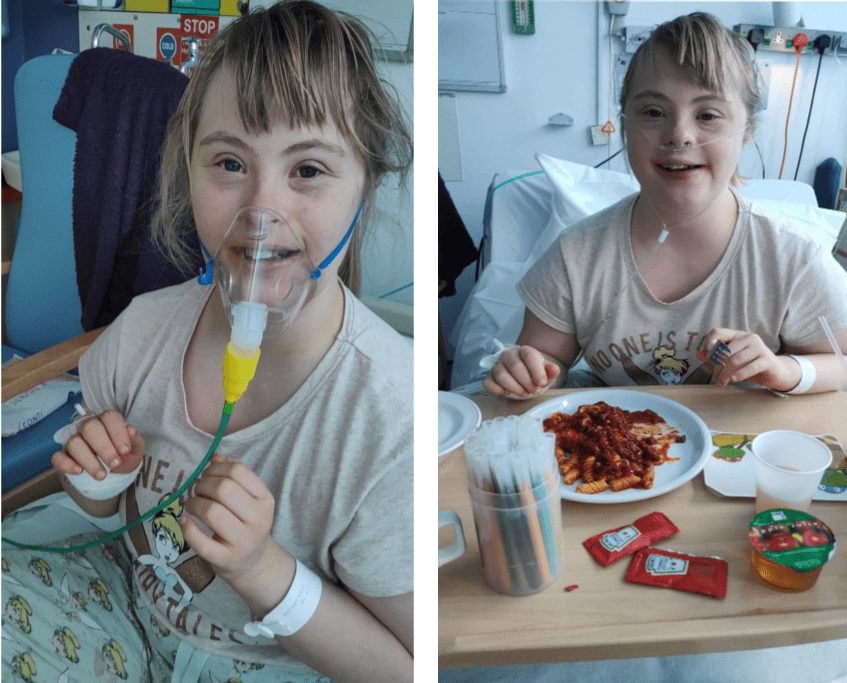By Sarah, Lauren’s Mum
In addition to having Down’s syndrome, in her teens Lauren was diagnosed with severe verbal dyspraxia and ASD with significant oppositional behaviour and demand avoidance. These diagnoses removed the stigma from us of “failing parents” and opened doors to get the right level of support.
In August 2018 Lauren moved into a supported living placement close to home after six years in independent specialist colleges. Since then we have seen her blossom into a much more independent young adult.
Lockdown & illness
When the UK went into lockdown we brought Lauren back home to be with us. Shortly afterwards her Dad became unwell and a few days later Lauren started to complain of feeling tired and that her head/neck hurt.
Over the next week to ten days she started to sleep more and lost interest in her normal activities, including FaceTiming her boyfriend. On day ten Lauren’s oxygen levels dipped and she was getting distressed saying her stomach really hurt.

Sarah in the PPE she was given on arrival at A&E.
Hospital
The paramedics were great and there was no problem with me going with Lauren in the ambulance. In A&E it was also accepted that I needed to be with Lauren and I was handed PPE gear to put on.
In the 18 minutes I had to pack whilst waiting for the ambulance I had printed a copy of Lauren’s hospital passport which included the need for 24/7 care. When Lauren was transferred on to a ward I went with her. We were put in a side room with a bed for me and there we stayed 24/7 for the next seven days.
Shortly after arrival in A&E I was asked to complete a Respect form. Lauren has no underlying conditions and an excellent quality of life and it was agreed that, if necessary, she would receive full escalation including ITU, intubation/Ventilation & CPR.
Lauren’s Covid-19 swab came back negative so a CT scan was arranged. Lauren was a star and pronounced the CT scanner “cool”. The results showed severe Covid-19 changes throughout her lungs but the staff were quick to reassure me that they had spoken with ICU and had a plan in place just in case, and that there would be a ventilator for her should she need it. That was probably the most frightening moment but thankfully the next level of intervention wasn’t required.
Without exception the staff were amazing. They listened to me and adapted their procedures accordingly.
For example Lauren hates blood pressure machines but we made a deal with the nurses that they could have one go to get it right, but if it didn’t work, we would stop. Every time they came to do it she reminded them…just once then stop. It definitely focused their minds and by the end of the week we had worked out the idiosyncrasies of the machine and how to fit the cuff to ensure they got a reading most of the time.

On the left, Lauren is in an oxygen mask in the earlier stages of her hospital stay. On the right, she just has just has nasal prongs, and she’s eating the first meal in hospital where she was able to feed herself.
Recovery
It took until day six for Lauren’s oxygen requirements to reach the point where she no longer needed supplementary oxygen and after 24 hours of observation we were finally allowed home.
On the left, Lauren is in an oxygen mask in the earlier stages of her hospital stay. On the right, she just has her nasal prongs, and she is eating the first meal in hospital where she was able to feed herself.
Within a few days, although still tiring easily and slightly short of breath, she was kicking a ball around the garden. Two weeks post discharge she is almost back to her normal self, interested again in all her activities and (much to her boyfriend’s relief ) happy to FaceTime him again.
We’d like to say a big thank you to Lauren and Sarah for sharing their experiences and wish her all the best as she continues to recuperate.
For guidance and resources on preparing for a potential hospital admission, including creating a hospital passport, download: Hospital admissions: being prepared.
If you have any questions, concerns or issues you would like to discuss, our email and telephone Helpline service is open as usual.
We are open Monday to Friday, 10am-4pm.
Email: info@downs-syndrome.org.uk | Call: 0333 1212 300
